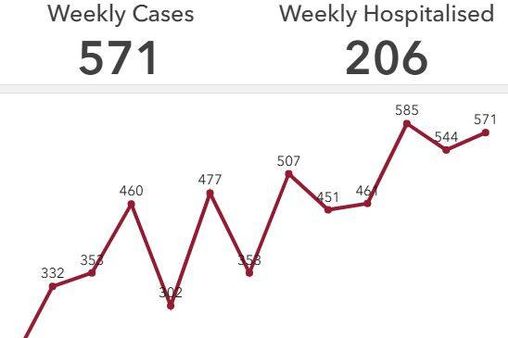Health
Covid Cases Surge in Ireland as New Stratus Variant Emerges

Ireland is witnessing a notable increase in Covid-19 cases, with 571 new infections reported in just the past week. Medical professionals are raising concerns about the latest strain, known as the Stratus variant or XFG, which is associated with unexpected symptoms that may be easily overlooked.
According to the Health Protection Surveillance Centre, the Stratus variant now accounts for nearly all new Covid-19 cases, making up 88.9% of reported infections. This is a significant rise from 49.3% six weeks ago. Dublin recorded the highest number of confirmed cases last week with 107 infections, followed by Kerry with 63 and Cork with 42. In contrast, Longford and Mayo each reported just one new case, while Carlow recorded three.
Symptoms Evolving with New Variant
The World Health Organization has categorized the Stratus variant as a “variant under monitoring.” It has noted that while this strain may not lead to more severe illness, it appears to spread more rapidly than previous variants. This increase in transmission is reflected in the rising case numbers across Ireland.
Healthcare professionals are now identifying subtle initial symptoms associated with the Stratus variant. Among the most prominent is a hoarse or gravelly voice, which may appear before more typical Covid-19 indicators. Dr. Kaywaan Khan, a GP at Harley Street, pointed out, “One of the most noticeable symptoms of the Stratus variant is hoarseness, which includes a scratchy or raspy voice.”
Other emerging symptoms include blocked sinuses, painful throats, digestive issues, and fatigue. Dr. Peter Chin-Hong, an infectious disease expert at the University of California, San Francisco, emphasized that the Stratus variant presents a wider range of symptoms. He stated, “There’s a little bit more sore throats with some people, particularly in those who are older and who didn’t get vaccinated last year.”
Dr. Chin-Hong also noted the variant’s increased transmissibility, particularly with children returning to school. “A sniffle is likely going to be Covid,” he added, drawing comparisons to earlier strains that caused similar symptoms.
Official Guidance Remains Steady
Despite the rise in cases, Ireland’s official Covid-19 guidance has not changed. The Health Service Executive (HSE) advises that if anyone experiences symptoms of Covid-19 and feels unwell, they should stay at home until 48 hours after symptoms have mostly or fully resolved. They also recommend avoiding contact with others, especially those at higher risk of severe illness from Covid-19. A Covid-19 test is not required unless directed by a GP or health professional.
The health authorities are urging the public to remain vigilant for the full range of 18 Covid-19 symptoms, ensuring that individuals are aware of the evolving nature of the virus and its variants. With the situation continuing to develop, staying informed and adhering to health guidance remains crucial for public safety.
-

 Entertainment1 month ago
Entertainment1 month agoAimee Osbourne Joins Family for Emotional Tribute to Ozzy
-

 Politics1 month ago
Politics1 month agoDanny Healy-Rae Considers Complaint After Altercation with Garda
-

 Top Stories3 weeks ago
Top Stories3 weeks agoIreland Enjoys Summer Heat as Hurricane Erin Approaches Atlantic
-

 World2 months ago
World2 months agoHawaii Commemorates 80 Years Since Hiroshima Bombing with Ceremony
-

 Top Stories2 months ago
Top Stories2 months agoFianna Fáil TDs Urgently Consider Maire Geoghegan-Quinn for Presidency
-

 World2 months ago
World2 months agoGaza Aid Distribution Tragedy: 20 Killed Amid Ongoing Violence
-

 World2 months ago
World2 months agoCouple Convicted of Murdering Two-Year-Old Grandson in Wales
-

 World2 months ago
World2 months agoAristocrat Constance Marten and Partner Convicted of Infant Murder
-

 Top Stories2 months ago
Top Stories2 months agoClashes Erupt Between Far-Right Groups and Migrants in Spain
-

 Top Stories2 months ago
Top Stories2 months agoHistoric Dalkey Pub The Queens Reopens Under New Management
-

 World2 months ago
World2 months agoTrump Defends FBI Deputy Director Amid Epstein Files Controversy
-

 Politics2 months ago
Politics2 months agoTragic Crowd Surge at Gaza Aid Center Claims 20 Lives









